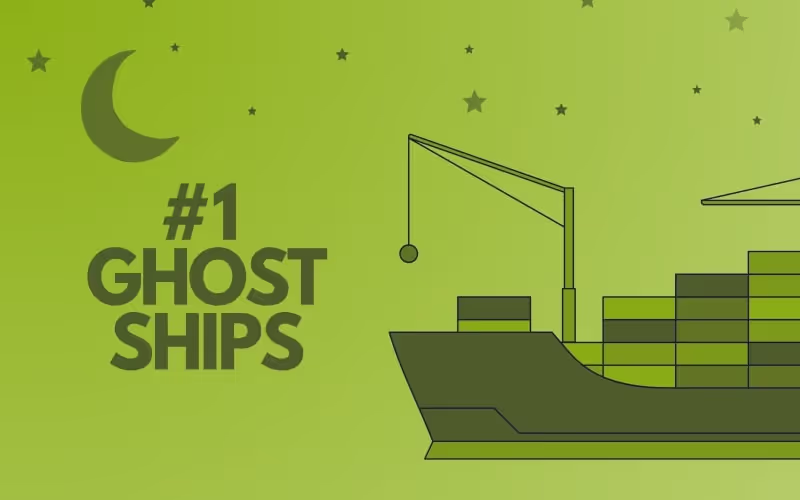
Deceptive Shipping Practices in Sanctions Evasion
Nefarious actors deploy deceptive shipping practices to get around sanctions. For example, entities from and working with North Korea, Iran, and Venezuela - some of the most sanctioned countries - are known for shadowy shipping techniques. In 2023, Russia is also firmly on that list. This article reveals the strategies used in the murky world of sanctions evasion in shipping - and why there is a growing concern.
The Concerning Rise of Deceptive Shipping Practices
We must first understand the broader situation before diving into the practical tactics used for sanctions evasion in shipping. Here is an astonishing statistic: 12% of ships and vessels crisscrossing the world's oceans have unknown owners. That's according to an S&P Global Market Intelligence report.
In 2023, this situation is increasingly worrying many sectors, especially finance. Why? The answer to this is twofold.
Firstly, the number of individuals and entities appearing on sanctions lists has increased significantly since the 2022 Russian invasion of Ukraine. And it's meant a rise in malevolent actors using deceptive shipping practices to evade sanctions.
Secondly, sanctions regimes, such as the US's Office of Foreign Assets Control (OFAC) and the United Kingdom's Office of Financial Sanctions Implementation (OFSI), have since 2020 required financial institutions to combat sanctions evasion and financial crime, such as money laundering, by monitoring suspicious vessel behavior more closely.
The maritime industry is also subject to compliance regulations - you can learn more about it in this detailed sanctions.io article. In addition, depending on the jurisdiction, all companies and organizations face a heightened risk of financial penalties for doing business with sanctioned individuals and entities.
And let's not forget; the penalties can be massive. For example, in early 2023, British-American Tobacco (BAT) received a whopping $635 million OFAC penalty for violating sanctions on North Korea (read about it here).
In the BAT case, the tobacco likely went to the isolated communist nation in Kim Jong Un's fleet of ghost ships. What is a ghost ship? It's one of the numerous deceptive shipping tactics used in sanctions evasion - which is what the following section will delve into.
Tactic 1: Ghost Ships
Ghost ships, also known as phantom vessels, have nothing to do with the supernatural. They are ships where a tracking device, called the Automatic Identification System (AIS), is switched off to avoid detection and monitoring. Unlike commercial airplanes, disabling the AIS on ships is relatively easy.
The International Maritime Organization's International Convention for the Safety of Life at Sea, requires AIS on international ships with 300 or more gross tonnage. All passenger ships (regardless of size) also require installation. AIS tracking data is open-source, meaning anyone, especially law enforcement agencies, can track vessels.
But there is a problem. Ships disappear when the captain turns the AIS off. During this period of 'going dark,' vessels can do several actions that often involve illicit activity, such as:
- Dock at a port in a country under sanctions
- Perform a ship-to-ship transfer at sea
- Change its destination and route
In 2023, all of the above scenarios are on the rise. For example, a special Financial Times investigation revealed Russia's grain smuggling in the Black Sea, exporting food from Crimea in covert ways that sidestep international sanctions.
Tactic 2: Ship-to-Ship (STS) Transfers
The next tactic used in the maritime industry to evade sanctions reads more like the script for a scene in a James Bond movie. Ship-to-Ship (STS) transfers, also known as lightering, are when ships exchange goods and fuel with each other offshore and away from prying eyes.
There are legitimate reasons to do this. But in the context of sanctions evasion, it's easy to imagine the backdrop: A moonlit night, the choppy waves of international waters, and a clandestine cargo exchange between two vessels. And, of course - the AIS on both ships disabled.
One of the most high-profile examples of STS transfers for sanction evasion in recent years comes from the Sea of Japan, where North Korean operatives and their associates are known to orchestrate covert exchanges.
Tactic 3: Taking Advantage of Ownership Transparency Weaknesses
The next illicit tactic that sanctions evaders use in the shipping industry is this: Targeting the weakness in vessel ownership transparency. It's also the most complex - so let's break this down into three parts:
The Maritime Industry Is Opaque
An often uncomfortable reality about shipping is that transparency doesn't come naturally. And when you look at the statistics, you begin to understand the complexities:
- Illicit trade through shipping is worth more than $1 Trillion annually
- Shipping carries more than 80 percent of the world's traded goods
- The average shipping company owns five ships
- More than 68,000 vessels operate in global shipping
Given the astonishing sums of money involved, the vast number of companies operating ships, and the global reach of the maritime industry, maintaining ownership transparency becomes a significant challenge.
Also, its decentralized nature and varying regulations across jurisdictions create an environment where opacity thrives.
Weak Beneficial Ownership Regulations and Enforcement
As mentioned earlier, a significant concern in global compliance, especially for financial institutions, is that 12% of ships have unknown owners. A vessel's beneficial owner is the individual or individuals who ultimately receive the economic benefit.
Industry observers find the situation worrying. For example, according to this report, in 2022, 500 ships with unknown owners visited ports in the United States more than 800 times.
And the greatest enabler of sanctions evasion in shipping is the maritime industry's weak beneficial ownership regulations and enforcement.
The situation is complex. Although the International Maritime Organization (IMO), a UN body, has its regulations, there are gaping holes. Here are some of them:
- Limited disclosure requirements
- Lack of verification
- Inadequate reporting and disclosure
- Limited resources to act
- National agendas override commitment to IMO regulations
To summarise this with a basic analogy, in many scenarios, it's perhaps like a school student telling their teacher they did their homework - and the teacher marking it as completed without even opening the page and checking it.
Hiding Behind Shell Companies and Complex Ownership Structures
To complete this section about how sanctions evaders in the maritime industry take advantage of ownership transparency weaknesses, we must also talk about the critical role of shell companies.
You can learn about shell companies in this sanctions.io article. A shell company (or ghost firm) is a legal entity with no active business operations or significant assets. They are not illegal but make crimes such as money laundering and sanctions evasion much easier.
And why is this so? Because shell companies are almost always created in jurisdictions with strict privacy laws, providing a legal veil of secrecy concealing the ultimate beneficial owners (UBOs) that receive the financial benefits.
Essentially, sanction evaders can:
- Exploit weak beneficial ownership regulations in the maritime industry
- Take advantage of shell companies in jurisdictions with strict privacy laws
- Create complicated ownership structures involving numerous shell companies
And back to the 12 percent statistic regarding unknown vessel owners due to weak regulations. What about the remaining 88 percent of known vessel owners?
Many murky ownership trails, where data is seemingly transparent, eventually lead to shell companies where identifying the UBO is extremely difficult for investigators due to strict privacy laws.
Tactic 4: Flags of Convenience
The next deceptive shipping practice used by criminal groups in sanctions evasion are flags of convenience. It's when a vessel is registered in a country with weak shipping regulations and minimal oversight.
Although the complete list is longer, a large proportion of ships in global trade are registered in the following countries due to the favorable conditions that they offer:
- Liberia
- The Marshall Islands
- Panama
It's worth noting that these favorable conditions offered in the countries above are also used for other purposes, such as paying less tax and lower wages to seafarers. For this reason, vessels with a flag of convenience were viewed as less risky by compliance professionals in financial institutions focusing on sanctions evasion and money laundering.
However, things are changing fast. According to the same S&P Global Market Intelligence report mentioned earlier, vessels registered in countries known for weak maritime oversight are now on an equal risk level to other red flags in shipping, such as AIS outages.
And the data backs this assessment up. The report also reveals that out of more than 8300 vessels with unknown owners investigated, 35% are sailing the world's oceans with one of the flags of Liberia, the Marshall Islands, or Panama.
More Deceptive Tactics & Final Thoughts
Sanctions evasion in the maritime industry is rising. Also, criminal networks are highly-skilled operators, deploying various tactics to import and export goods from sanctioned countries and ports illegally.
This article examined the most complex and concerning tactics. But many exist, such as false documentation and labeling of products. Corruption and bribery at the world's ports are significant problems too.
And the reality is this: It's giving global compliance professionals, especially in the financial sectors, a major headache.
The cost of non-compliance can be staggering in monetary and reputational terms. Penalties and PR disasters aside, organized crime groups engaged in sanctions evasion are often associated with other illegal activities, such as trade-based money laundering and importing illicit goods, such as counterfeit drugs.
But here is the good news. Compliance teams also have an arsenal of tactics they can deploy to help prevent sanctioned individuals and entities from using their business as part of an illicit sanctions evasion scheme.
Sanctions screening, as offered by sanctons.io, is one of them. To read our ultimate guide to sanctions screening, click here.
sanctions.io is a highly reliable and cost-effective solution for sanction checking. AI-powered and with an enterprise-grade API with 99.99% uptime are reasons why customers globally trust us with their sanctions screening needs.
And here is some more good news: We offer a free 7-day trial (no credit card is required).



